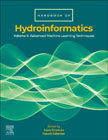
Handbook of HydroInformatics: Volume II: Advanced Machine Learning Techniques
Eslamian, Saeid
Eslamian, Faezeh
Advanced Machine Learning Techniques, Volume Two in the Handbook of HydroInformatics series, presents both the art of designing good learning algorithms, as well as the science of analyzing an algorithm's computational and statistical properties and performance guarantees. Global contributors cover theoretical foundation topics such as computational and statistical convergence rates, minimax estimation and concentration of measure. Advanced machine learning methods such as nonparametric density estimation, nonparametric regression, and Bayesian estimation, as well as advanced frameworks such as privacy, causality and stochastic learning algorithms are also included. Other methods covered include Cloud and Cluster Computing, Data Fusion Techniques, Empirical Orthogonal Functions and Teleconnection, Internet of Things, Kernel-Based Modeling, Large Eddy Simulation, Patter Recognition, Uncertainty-Based Resiliency Evaluation, and Volume-Based Inverse Mode, making this word an interdisciplinary guide that will appeal to post graduates interested in Computer Science, Artificial Intelligence, Mathematical Science, Applied Science, Earth and Geoscience, Geography, Civil Engineering, Engineering, Water Science, Atmospheric Science, Social Science, Environment Science, Natural Resources and Chemical Engineering. Contains contributions from the fields of data management research, climate change and resilience, insufficient data problem, and more Presents applied examples and case studies in each chapter, providing the reader with real-world scenarios for comparison Defines both the designing of good learning algorithms, as well as the science of analyzing an algorithm's computational and statistical properties and performance guarantees INDICE: 35. Bayesian Estimation36. Cloud and Cluster Computing37. Computational and Statistical Convergence Rates38. Concentration of Measure39. Cross Validation40. Data Assimilation41. Data Fusion Techniques42. Deep Learning43. Empirical Orthogonal Functions44. Empirical Orthogonal Teleconnection45. Error Modeling46. GARCH Time Series Analysis47. Gradient-Based Optimization48. Internet-Based Methods49. Internet of Things50. Kernel-Based Modeling51. Large Eddy Simulation52. Markov Chain Monte Carlo Methods53. Minimax Estimation54. Model Fusion Approach55. Monitoring Quality Sensors56. Nested Reinforcement Learning57. Nested Stochastic Dynamic Programming58. Nonparametric Density estimation59. Nonparametric Regressions60. Operational Real-Time Forecasting61. Patter Recognition62. Self-Adaptive Evolutionary Extreme Learning Machine63. Stochastic Learning Algorithms64. Supercomputing Methods (Parallelization/GPU)65. Transient-Based Time-Frequency Analysis66. Uncertainty-Based Resiliency Evaluation67. Volume-Based Inverse Mode68. WebGIS
- ISBN: 978-0-12-821961-4
- Editorial: Elsevier
- Encuadernacion: Rústica
- Páginas: 450
- Fecha Publicación: 01/10/2022
- Nº Volúmenes: 1
- Idioma: Inglés
